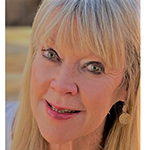The car accident in 2021 started it all, recalls Nancy Tarbox, 62, owner of a housecleaning service in Bradley, SD. In the process of treating her after the accident, doctors discovered some health issues, including cardiac problems. Turns out, she needed a stent, a device to keep blood vessels open. And after that, her doctors sent her off to cardiac rehabilitation.
She committed to attending the program—a mix of health information from experts, discussions with other rehab patients and workouts on exercise equipment—to get healthier and stay that way. Now, more than 36 sessions later, she’s lost 20 pounds and gained a new understanding of how to live a healthy life. She’s actually ”graduated” but continues to attend the sessions.
The Power of Support Groups
She’s also found out about the power of support groups, and the opportunities they provide for socialization.
“One guy I’ve gotten to know has been coming since 2019”
While the information from the experts who lead the lectures is valuable, so is the social support, motivation and tips from others in the program, Tarbox says. “One guy I’ve gotten to know has been coming since 2019,” she says.
During a recent workout, they were having such an interesting conversation that her goal of working out for 20 minutes went by quickly. “He’s been a positive for me,” she says, and she also enjoys seeing him make progress.
After a recent talk by a dietitian on avoiding sugars, Tarbox and others compared notes. Someone suggested always checking a food label and focusing on the amount of added sugars. “Now I see the added sugars,” she says, and she now knows they can add up. “I’ve learned a lot from the people [in the program].” During the entire course, she says, “I can’t say I got discouraged. But if I had I know the others would have helped me.”
Support Groups – a Therapy Alternative?
While support groups can be very helpful for any age, ”for some older adults a support group is more acceptable than seeing a therapist or counselor,” says Norman Abeles, PhD, professor emeritus of psychology at Michigan State University. He finds that while some prefer the anonymity of internet support groups, with no video, other prefer face to face.
Why are they so helpful? “Knowing that there are others with similar concerns can be helpful in that it facilitates the reduction of anxiety, depression or both,” he says. In the groups, people may find it easier to air concerns they would not ordinarily share with family and friends. By talking to others with the same issues, those in support groups often recognize they, too, can solve problems they once thought were impossible.
Finding Support Groups
So, how and where to find the groups? Organizations such as AARP, Senior Planet, county and state offices on aging are good places to start, Dr. Abeles says. He adds a few other considerations:
If cost is a concern, know that many do not charge.
If staying anonymous is important, it’s crucial to clarify if that’s possible up front/
Some groups are led by a professional and have structured programs, while other groups are without a leader and can also work well.
Before joining, Dr. Abeles suggests getting some facts such as the usual number of participants, length of the sessions and whether everyone is experiencing the same sort of issues.
Need more info on Support Groups?
Mayo Clinic experts have more advice on finding a good support group; learn more here.
Among some well-known support groups are those run by the American Heart Association, the Alzheimer’s Association, the Arthritis Foundation and the Caregiver Action Network. Another option: Start your own on Facebook by forming your own group. You serve as the administrator, set the rules and post the meetings.
Have you gotten a little help from friends in support groups? Please let us know in the comments!

Kathleen Doheny is a Los Angeles-based independent journalist, specializing in health, behavior, fitness and lifestyle stories. Besides writing for Senior Planet, she reports for WebMD, Medscape, Endocrine Web, Practical Pain Management, Spine Universe and other sites. She is a mom, mother-in-law and proud and happy Mimi who likes to hike, jog and shop.







